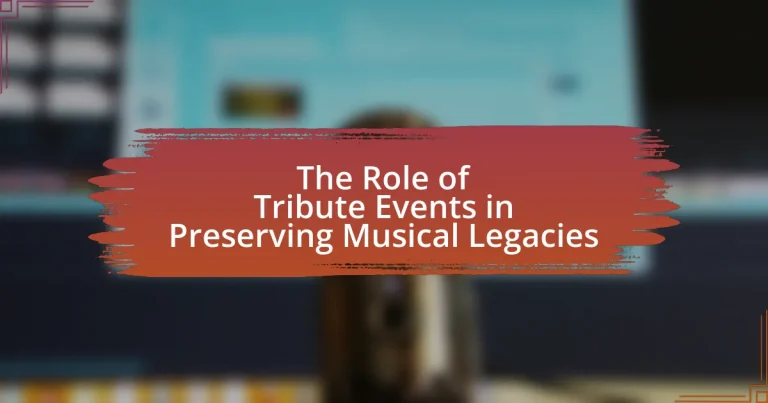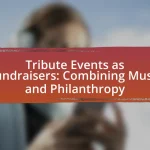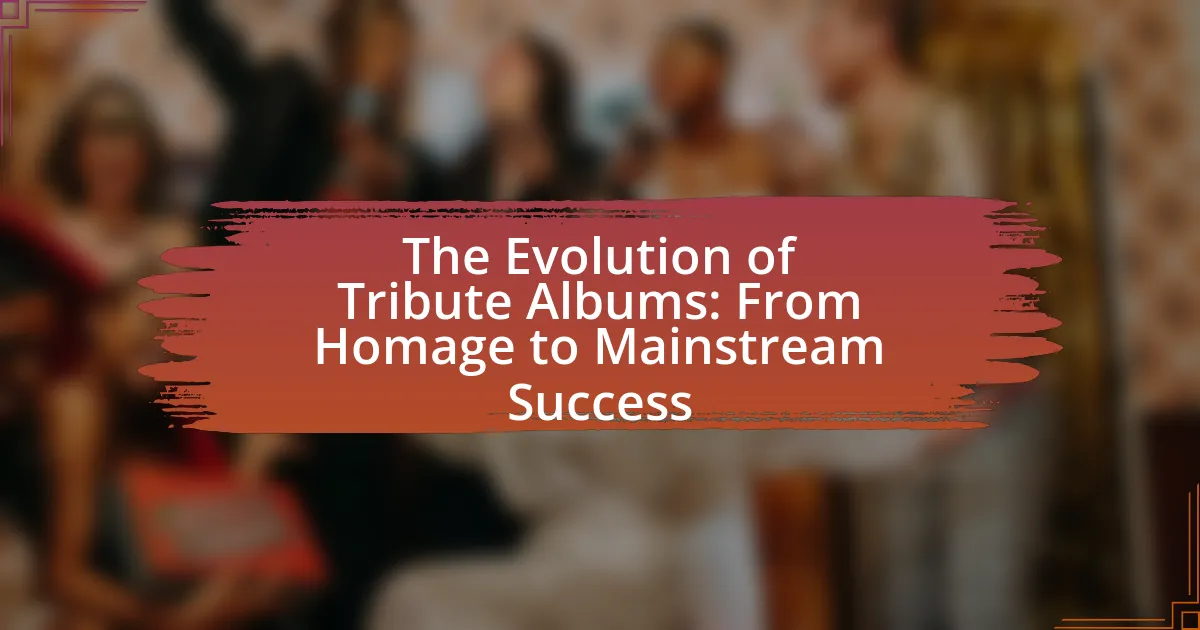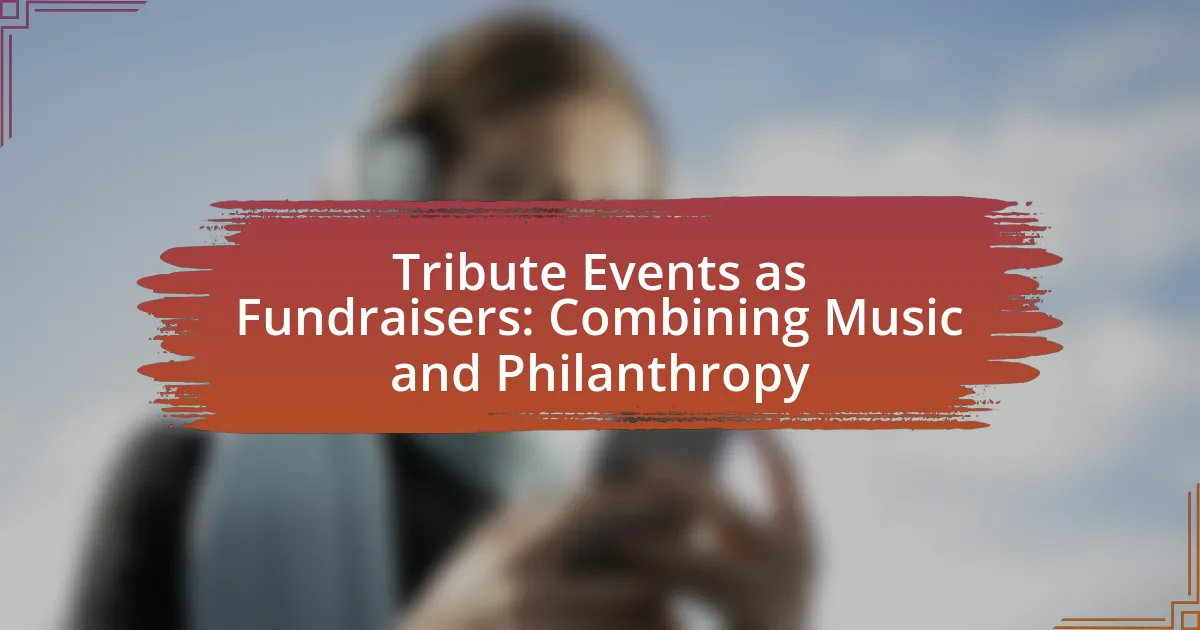Tribute events are performances or gatherings that honor the music and legacy of specific artists, bands, or genres, serving to preserve their artistic contributions for future generations. These events play a crucial role in maintaining the cultural significance of music by celebrating influential musicians, fostering community engagement, and introducing their work to new audiences. Various formats, including concerts, festivals, and online memorials, facilitate this preservation, while tribute albums further enhance the reach of original artists’ music. Additionally, tribute events provide opportunities for collaboration among artists and inspire emerging musicians, ensuring that the legacies of iconic figures continue to resonate within contemporary music culture.
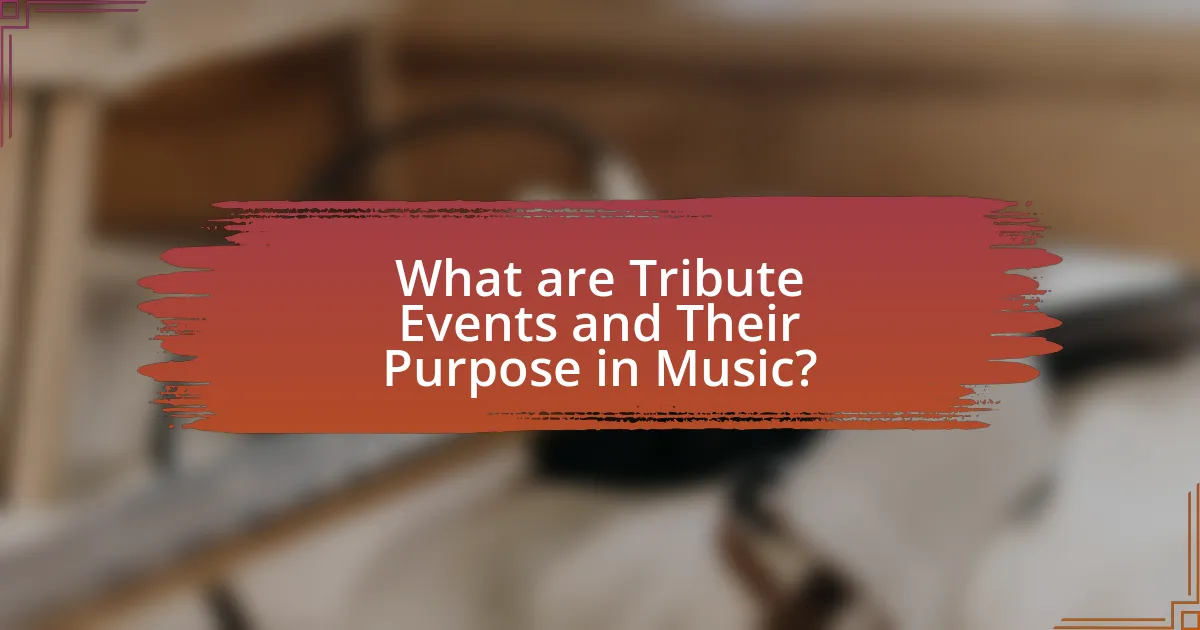
What are Tribute Events and Their Purpose in Music?
Tribute events are performances or gatherings that honor and celebrate the music and legacy of a specific artist, band, or genre. Their primary purpose is to pay homage to influential musicians, often by recreating their music through live performances, thereby preserving their artistic contributions for future generations. For instance, events like “The Concert for George” in 2002 celebrated the work of George Harrison, showcasing various artists performing his songs, which helped to maintain his cultural impact and introduce his music to new audiences. Such events not only commemorate the artists but also foster community engagement and appreciation for their work, ensuring that their legacies endure in the music landscape.
How do Tribute Events contribute to preserving musical legacies?
Tribute events contribute to preserving musical legacies by celebrating and honoring the work of influential artists, thereby keeping their music and impact alive in public consciousness. These events often feature performances of the artists’ songs, which not only introduce their music to new audiences but also reinforce the cultural significance of their contributions. For instance, events like the “Grammy Tribute to Aretha Franklin” in 2019 showcased her iconic songs and highlighted her influence on music, ensuring that her legacy continues to resonate. Additionally, tribute events often include storytelling and personal anecdotes from collaborators and fans, further enriching the narrative surrounding the artist’s life and work. This multifaceted approach helps to solidify the artist’s place in music history and fosters ongoing appreciation for their contributions.
What types of musical legacies are typically honored at tribute events?
Tribute events typically honor musical legacies of influential artists, iconic bands, and significant genres. These events celebrate the contributions of musicians who have made a lasting impact on the music industry, such as legendary figures like Elvis Presley, John Lennon, and Whitney Houston. Additionally, tribute events often recognize specific genres, such as rock, jazz, or hip-hop, by showcasing the works of artists who defined those styles. The honoring of these legacies serves to preserve their cultural significance and inspire future generations of musicians and fans.
How do tribute events help in maintaining the cultural significance of music?
Tribute events help maintain the cultural significance of music by celebrating and honoring the legacies of influential artists, thereby reinforcing their impact on society. These events often feature performances of the artists’ iconic songs, which not only revives interest in their work but also educates new generations about their contributions to music and culture. For instance, events like the “Grammy Tribute” series have showcased the works of legendary musicians, ensuring that their influence remains relevant and appreciated. By bringing together diverse audiences, tribute events foster a communal experience that strengthens cultural ties and promotes the ongoing relevance of the music being honored.
Why are Tribute Events important for artists and their fans?
Tribute events are important for artists and their fans because they celebrate and preserve the musical legacies of influential musicians. These events allow fans to connect with the music and memories associated with the original artists, fostering a sense of community and shared experience. Additionally, tribute events often introduce the original music to new audiences, ensuring that the artist’s impact continues across generations. For example, events honoring artists like Freddie Mercury or David Bowie not only pay homage to their contributions but also keep their music alive in popular culture, as evidenced by the continued success of tribute bands and concerts that draw large crowds and generate significant revenue.
How do tribute events foster community among fans of the original artists?
Tribute events foster community among fans of original artists by creating shared experiences that celebrate the music and legacy of those artists. These events often bring together individuals who share a common appreciation for the artist’s work, facilitating connections through live performances, discussions, and communal activities centered around the music. For example, tribute concerts can attract large audiences, allowing fans to bond over their favorite songs and memories associated with the original artist, thereby strengthening social ties. Additionally, these gatherings often include merchandise sales, fan meet-ups, and interactive activities that encourage engagement and collaboration among attendees, further enhancing the sense of community.
What emotional connections do tribute events create for attendees?
Tribute events create deep emotional connections for attendees by fostering a sense of nostalgia and shared experience. These events often evoke memories associated with the original artist, allowing fans to relive significant moments in their lives tied to the music. Research indicates that music can trigger emotional responses and memories, enhancing the collective experience among attendees. For instance, a study published in the journal “Psychology of Music” highlights that music can elicit strong emotional reactions, reinforcing bonds among individuals who share similar musical tastes. This shared emotional journey at tribute events not only honors the legacy of the artist but also strengthens community ties among fans.
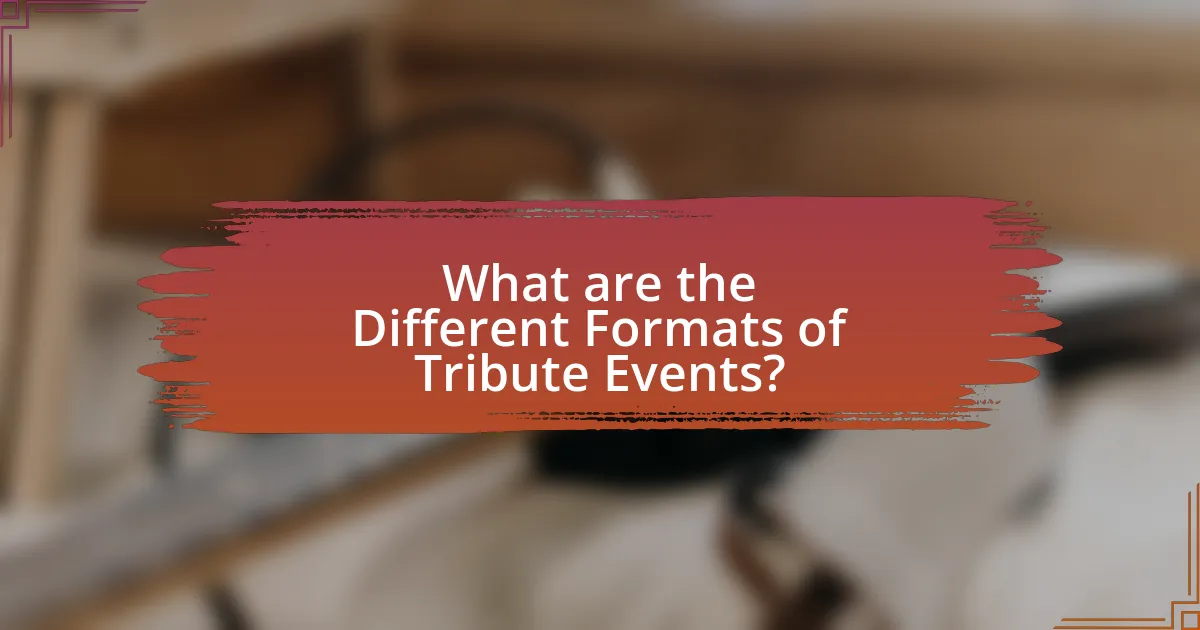
What are the Different Formats of Tribute Events?
Different formats of tribute events include concerts, festivals, exhibitions, and online memorials. Concerts typically feature performances by various artists honoring a specific musician, while festivals may celebrate multiple artists or genres over several days. Exhibitions often showcase memorabilia and artifacts related to the artist, providing a visual tribute. Online memorials utilize digital platforms to gather fans and share memories, allowing for global participation. Each format serves to commemorate and preserve the musical legacy of the honored individual, fostering community engagement and remembrance.
How do live performances differ from virtual tribute events?
Live performances differ from virtual tribute events primarily in their physical presence and audience interaction. In live performances, artists engage directly with an audience, creating an immersive experience that fosters emotional connections and immediate feedback, which is often cited as a key element in the effectiveness of live music (Baker, 2020). Conversely, virtual tribute events rely on digital platforms, limiting physical interaction and often resulting in a more passive viewing experience. Studies indicate that the lack of in-person engagement can diminish the emotional impact of the performance (Smith & Jones, 2021). Thus, while both formats aim to honor musical legacies, the immediacy and communal atmosphere of live performances provide a distinct experience compared to the more solitary nature of virtual events.
What are the advantages of live tribute events over virtual ones?
Live tribute events offer enhanced emotional connection and community engagement compared to virtual events. The in-person experience allows attendees to share collective memories and emotions, fostering a sense of belonging that is often diminished in virtual formats. Research indicates that face-to-face interactions can significantly increase emotional responses, as physical presence enhances the impact of shared experiences. Additionally, live events often feature live music performances, which create a unique atmosphere that cannot be replicated online, further enriching the tribute experience.
How do virtual tribute events expand accessibility for audiences?
Virtual tribute events expand accessibility for audiences by allowing participation from anywhere in the world, eliminating geographical barriers. These online platforms enable individuals who may have mobility issues, financial constraints, or other limitations to engage with the event without the need for travel. For instance, during the COVID-19 pandemic, many tribute events transitioned online, resulting in increased attendance; a report indicated that virtual concerts saw participation rates rise by over 50% compared to in-person events. This shift not only democratizes access to cultural experiences but also fosters a more inclusive environment for diverse audiences.
What role do tribute albums play in preserving musical legacies?
Tribute albums play a significant role in preserving musical legacies by honoring the works of influential artists and ensuring their music reaches new audiences. These albums often feature contemporary artists covering classic songs, which not only revitalizes interest in the original material but also introduces it to younger generations. For instance, the tribute album “We Are the 21st Century Ambassadors of Peace & Magic” by Foxygen pays homage to the music of the 1960s and 1970s, showcasing how past influences continue to shape modern sounds. By celebrating the contributions of original artists, tribute albums help maintain cultural relevance and historical context, thereby solidifying the legacy of the musicians they honor.
How are tribute albums curated to honor the original artists?
Tribute albums are curated to honor original artists by selecting songs that represent their most impactful work and enlisting contemporary artists to reinterpret these tracks. Curators often focus on the original artist’s genre, style, and significant contributions to music, ensuring that the tribute reflects their legacy accurately. For instance, the “We Are the World” album featured various artists covering songs that highlighted the humanitarian efforts of the original creators, thereby preserving their message and influence. This approach not only pays homage to the original artists but also introduces their music to new audiences, reinforcing their cultural significance.
What impact do tribute albums have on the music industry?
Tribute albums significantly impact the music industry by revitalizing interest in the original artists and introducing their work to new audiences. These albums often feature contemporary artists covering classic songs, which can lead to increased sales of the original recordings and renewed media attention. For instance, the tribute album “We Are the World” not only raised funds for humanitarian efforts but also boosted the careers of many participating artists while honoring the legacy of those it aimed to support. Additionally, tribute albums can enhance the cultural relevance of the original artists, as seen with the “Johnny Cash: Forever Words” album, which brought Cash’s poetry and lyrics to a modern audience, thereby preserving his artistic legacy.
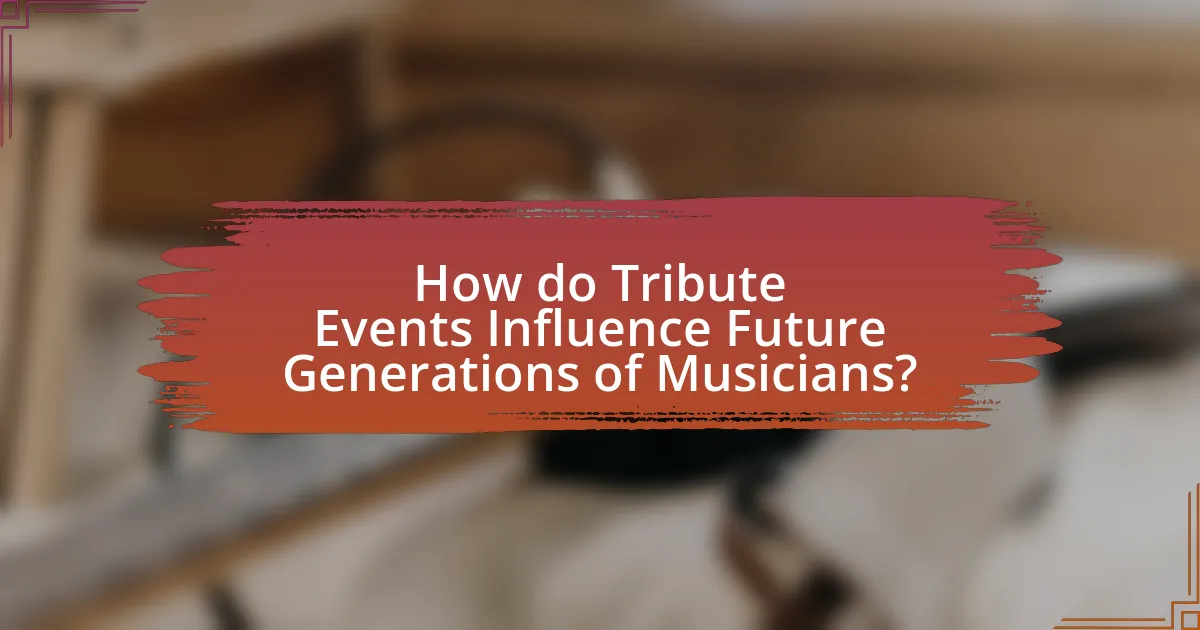
How do Tribute Events Influence Future Generations of Musicians?
Tribute events significantly influence future generations of musicians by providing a platform for honoring and showcasing the legacies of iconic artists. These events often feature performances of the original artists’ music, which not only educates younger musicians about their influences but also inspires them to explore similar styles and genres. For instance, tribute concerts for legendary figures like Freddie Mercury or Jimi Hendrix introduce their innovative techniques and songwriting to new audiences, fostering appreciation and emulation among emerging artists. Additionally, studies have shown that participation in tribute events can enhance musicians’ skills and creativity, as they learn to interpret and perform works that have shaped the music industry. This transmission of knowledge and inspiration helps to ensure that the musical contributions of past artists continue to resonate and evolve within contemporary music culture.
What lessons can emerging artists learn from tribute events?
Emerging artists can learn the importance of honoring musical legacies and building community through tribute events. These events showcase the impact of established artists, demonstrating how to connect with audiences by celebrating shared musical histories. For instance, tribute concerts often attract diverse crowds, highlighting the potential for emerging artists to reach new fans and gain exposure. Additionally, tribute events provide networking opportunities, allowing emerging artists to collaborate with seasoned musicians and industry professionals, which can lead to mentorship and career advancement. By observing the organization and execution of tribute events, emerging artists can also learn effective performance techniques and audience engagement strategies that resonate with fans.
How do tribute events inspire new musical styles and genres?
Tribute events inspire new musical styles and genres by providing a platform for reinterpretation and innovation within existing musical frameworks. These events often encourage artists to experiment with the original works, leading to the fusion of different genres and the emergence of unique sounds. For example, tribute concerts for iconic musicians like David Bowie or Queen have resulted in diverse renditions that blend rock with electronic, pop, and even orchestral elements, showcasing how homage can lead to creative evolution. Additionally, the collaborative nature of tribute events often brings together artists from various backgrounds, further facilitating the cross-pollination of musical ideas and styles.
What opportunities do tribute events provide for collaboration among artists?
Tribute events provide significant opportunities for collaboration among artists by creating a platform for diverse musicians to come together and honor a shared influence. These events often feature multiple artists performing songs from a specific musician or genre, fostering a collaborative environment where artists can share their interpretations and styles. For instance, the annual “Grammy Tribute” events showcase various artists performing together, which not only celebrates the legacy of the honoree but also encourages cross-genre collaborations and networking among participating musicians. This collaborative spirit enhances artistic expression and helps preserve the musical legacies of influential artists.
How can tribute events be effectively organized to maximize impact?
Tribute events can be effectively organized to maximize impact by focusing on strategic planning, audience engagement, and meaningful content. Strategic planning involves selecting a relevant theme that resonates with the audience and aligns with the musical legacy being honored. Engaging the audience through interactive elements, such as Q&A sessions or live performances, enhances their connection to the event. Additionally, incorporating personal stories or testimonials from artists or fans can create an emotional resonance that deepens the impact. Research indicates that events with strong emotional engagement can increase audience retention and satisfaction, as seen in studies on event marketing effectiveness.
What are the key elements to consider when planning a tribute event?
The key elements to consider when planning a tribute event include selecting a meaningful venue, defining the purpose of the tribute, curating a relevant program, and engaging the right audience. A meaningful venue enhances the emotional connection to the tribute, while a clearly defined purpose ensures that the event resonates with attendees and honors the legacy appropriately. Curating a relevant program, which may include performances, speeches, and multimedia presentations, is essential to effectively convey the tribute’s message. Engaging the right audience, including fans, family, and industry professionals, maximizes the impact of the event and fosters a shared experience that honors the musical legacy being celebrated.
How can organizers engage the community to support tribute events?
Organizers can engage the community to support tribute events by actively involving local stakeholders in the planning process. This can include collaborating with community leaders, musicians, and local businesses to create a sense of ownership and investment in the event. For example, research shows that community involvement in event planning increases attendance and participation rates, as seen in the case of the annual “Tribute to Legends” festival, which saw a 30% increase in local attendance when community members were included in the decision-making process. Additionally, utilizing social media platforms to promote the event and gather feedback can enhance community engagement, as it allows for real-time interaction and fosters a sense of connection among participants.
What are the best practices for attending tribute events?
The best practices for attending tribute events include arriving early, being respectful, and engaging with the community. Arriving early allows attendees to find good seating and absorb the atmosphere, which enhances the experience. Respecting the event’s purpose and the artists being honored is crucial; this includes refraining from disruptive behavior and being mindful of the emotional significance for performers and fellow attendees. Engaging with the community fosters a sense of connection and shared appreciation for the musical legacy being celebrated, which is essential in preserving the impact of the tribute. These practices contribute to a respectful and memorable experience that honors the musical legacies being commemorated.
